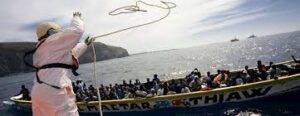GENEVA (10-11 December) – Today, the UN High Commissioner for Refugees (UNHCR) concludes its annual High Commissioner’s Dialogue on Protection Challenges, focusing on the critical challenges facing refugees and asylum seekers arriving by sea.
This year’s ‘Protection at Sea‘ focus is a key element of UNHCR’s two-year Global Initiative on Protection at Sea, which aims to support States to take action to limit the loss of life at sea, as well as the exploitation, abuse and violence to which refugees, asylum seekers, stateless persons and migrants are subjected in their journeys. The Dialogue brings together States, NGO’s, IGO participants and experts from around the world to exchange views about gaps and challenges in the protection of refugees and asylum seekers.
Critical topics for discussion included: criminalization and detention of asylum seekers and irregular migrants, rescue and disembarkation, reception, and addressing the drivers of flight. The IDC’s Europe Regional Coordinator, Ms. Jem Stevens, attended the Dialogue on behalf of the IDC and brought specific attention to the systematic and arbitrary detention of migrants arriving by sea:
“The systematic detention of migrants arriving by sea is by definition arbitrary, since it is not based on an individualized assessment of risk and it is not applied only as a last resort. Thus, as a general rule, asylum seekers, stateless persons, trafficking victims and survivors of torture should never be detained based on immigration status alone. . . . Disembarkation areas cannot be treated as zones of exception.”
In his opening remarks, the UN High Commissioner for Refugees, Mr. António Guterres, set the stage, drawing attention to the need for a concerted global, humanitarian response.
“States’ responses to this complex and growing challenge have been mixed. But one thing is clear: focusing only on border control and deterrence will not solve the problem.”
High Commissioner Guterres was later joined by the newly-appointed UN High Commissioner for Human Rights, Mr. Zeid Ra’ad Al Hussein, who similarly noted the urgent need to adopt protection mechanisms for those people who desperately risk their life in search of safety and security:
“When migrants are left to drift for weeks without access to food and water; when ships deliberately refuse to rescue migrants in distress; when children in search of family reunification are detained indefinitely, denied education and care, or returned to perilous situations – these are grave human rights violations.”
High Commissioner Al Hussein reminded the participants that, although states have a right to determine who enters their territory, they are limited by international law and fundamental human rights principles. For example, the UN Working Group on Arbitrary Detention has made clear since 2008 that, “criminalizing [irregular] entry into a country exceeds the legitimate interest of States to control and regulate [irregular] immigration and leads to unnecessary detention.”
“States must refrain from using harsh interception and deterrence measures to prevent people from reaching their territory. On arrival, every person has the right to individual determination of her or his situation, and specific attention must be paid to those who are at particular risk, such as children, pregnant women, victims of torture, survivors of sexual or gender-based violence, persons with disabilities, and older persons.”
Throughout the two-day Dialogue, a number of key points were discussed and agreed-upon, including that:
– search and rescue (SAR) operations need increased regional support;
– states should provide emergency care, psychological support and should undertake screening for vulnerabilities during disembarkation and reception;
– there is a need to combat the xenophobic, anti-foreigner sentiment which has influenced and drives current “deterrence” policies.
For more information, contact IDC Advocacy Coordinator, Ben Lewis ([email protected]).
Resources:
IDC Submission: Detention and Alternatives for Migrants at Sea
NGO Submission: Key NGO Messages to the High Commissioner’s Dialogue on Protection at Sea
UNHCR: Opening remarks by Mr. António Guterres, United Nations High Commissioner for Refugees
OHCHR: Statement by Mr. Zeid Ra’ad Al Hussein, United Nations High Commissioner for Human Rights
OHCHR: Recommended Principles and Guidelines on Human Rights at International Borders
